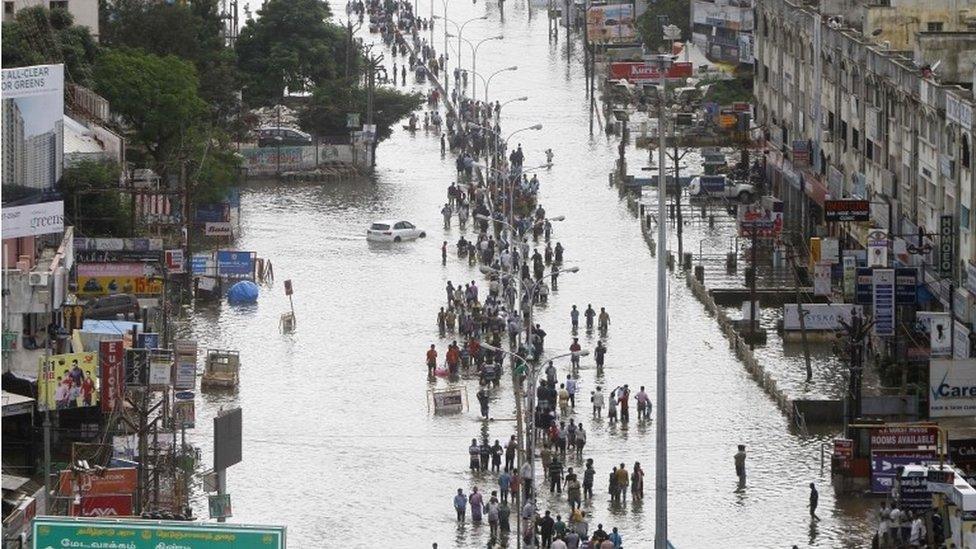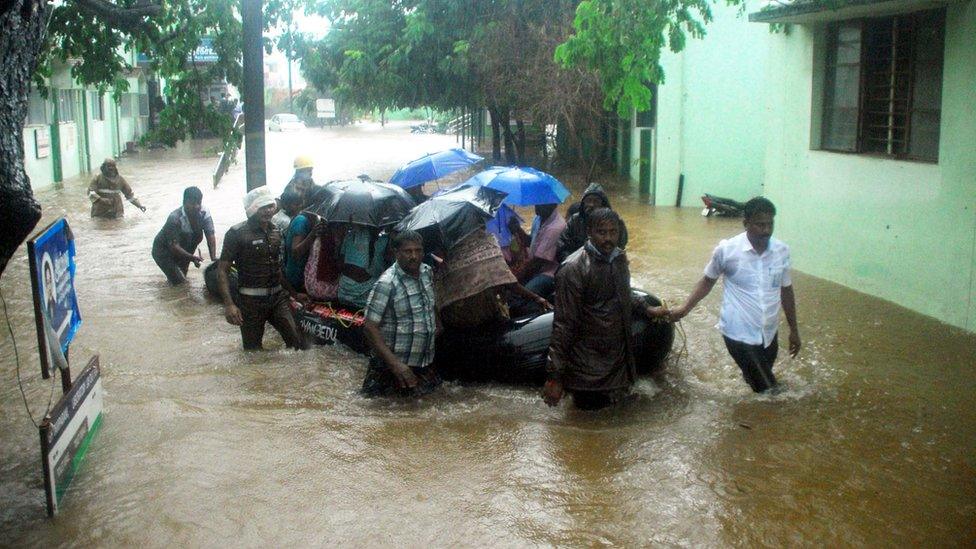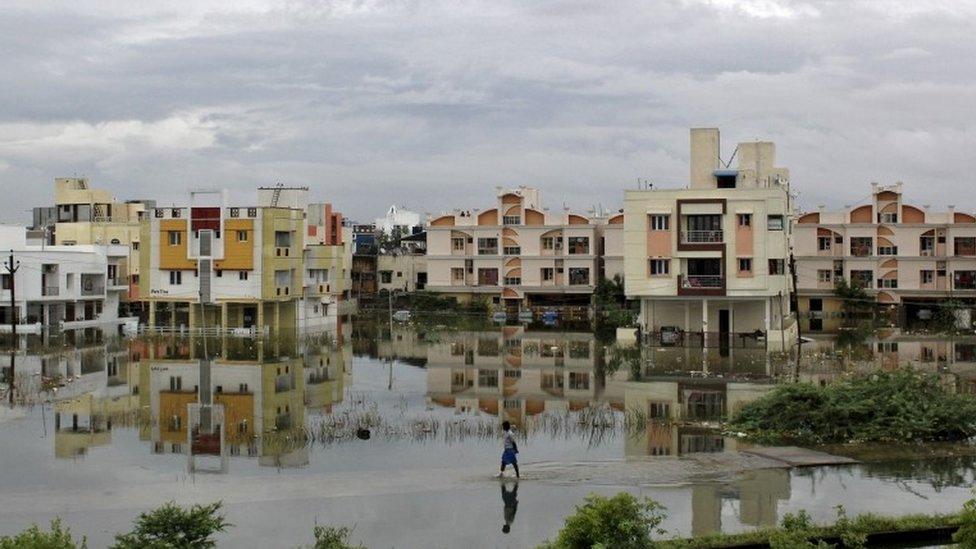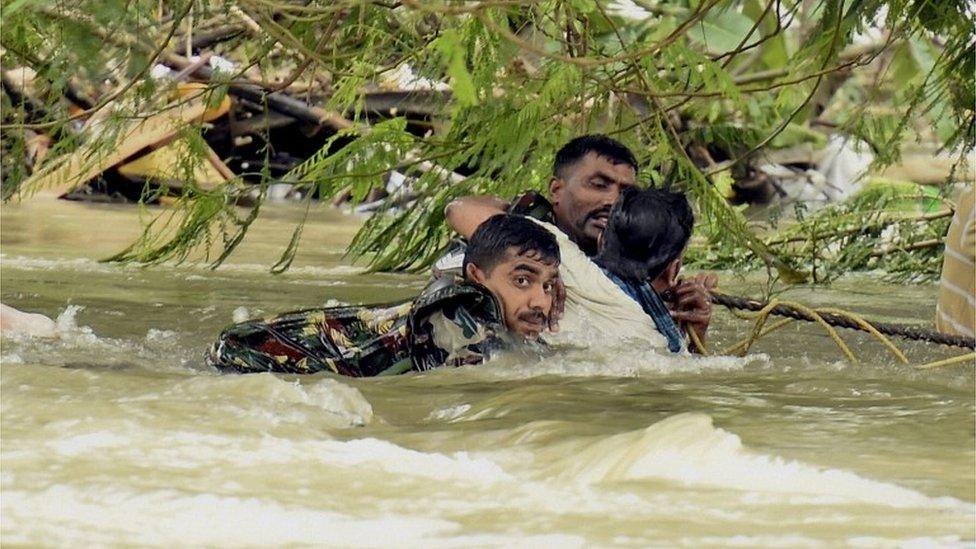The volunteers who kept Chennai afloat through the floods
- Published

As much as 272 mm of rain drenched the city in a 24-hour period
On 2 December 2015, the south Indian city of Chennai (Madras) witnessed devastating floods, after receiving the heaviest rainfall it had witnessed in a century. As much as 272 mm of rain drenched the city in a 24-hour period.
The waters marooned large parts of the city for several days and rescue efforts were hampered by the lack of electricity and mobile connectivity, but the city's citizenry rose magnificently to the occasion in a massive volunteering effort.
Some pitched in by coordinating with the government. Others helped through non-governmental organisations (NGOs).
Journalists Karthik Subramanian and PM Naveen spoke to some of them a year after the experience.

Ashwin Chhabria, research analyst

The 23-year-old joined the crisis management team of "Chennai Rain Relief", an umbrella organisation that was stitched together by several NGOs to help the government with rescue and relief work.
He primarily helped connect rescue workers with stranded people by developing a code that used geo-tags to quickly connect rescue workers with victims. Mr Chhabria, who had no coding knowledge, says he received help from "techie" friends working in Singapore and Silicon Valley. The code helped rescue teams identify more than 1,500 persons in need of bare necessities like clothes and food.
"The floods taught me lessons in humility. I did not know how to code. But by quickly asking for help, I was able to execute something that helped so many people. I found a way to be helpful to others. That was the biggest learning. That if you want to, you can help one way or the other," he said.

Naveen Kumar Janarthanan, software consultant

Inspired by a friend, Mr Janarthanan (28) made a Facebook post opening up his apartment to stranded people.
He is a part of his company's corporate social responsibility wing called "Carestream" that collects used clothes, sorts them and packages it for re-use with orphanages and other social enterprises.
While volunteering, he helped identify and deliver dry clothes to those stuck in flooded areas. He was also part of the team at "Chennai Rain Relief".
"I am from a small town and came to Chennai in 2008 for my higher studies and career. I always felt Chennai was not a city that welcomes outsiders easily. But I changed my opinion during the floods. Everyone was helping everyone else. It was an unique experience. Now I feel like an insider," he told the BBC.

Pradeep John, amateur weather blogger

Mr John (35), who goes by the name "Tamil Nadu weatherman" regularly updated his Facebook page with weather predictions based on numerical models used by the scientific community Global Forecasting System and European Centre for Medium Range Weather Forecasts.
Some of his posts reached over 200,000 users. As he became the "go to" weather forecaster on social media, Mr John's updates began to be used by rescue teams. Since then, his social media following has grown from 5,000 followers in December 2015 to 135,000 followers, all who look to him for weather updates.
"Until that time, I was just predicting rains. But people looking at my updates started asking me whether it would soon be safe to go home. They wanted to know when the rains would stop. I started feeling responsible for them. All weather watchers are lovers of rains. But that day I was just praying that the rains would stop," Mr John says of his experience.

Sathyarupa Shekhar, Director, citizen consumer and Civic Action Group (CAG)

Ms Shekhar partnered with an online store to design a relief kit containing essentials like dry food and blankets that were in high demand during the floods.
She distributed around 1,000 of those kits to residents of slums in the northern Chennai as part of relief and rescue operations. She also assessed the effectiveness of relief efforts in slum areas.
She said that the floods reinforced and revealed existing deprivations and inequities.
"There are several structural problems that arose from past urban development interventions such as the lack of adequate land for the poor and insufficient affordable housing," she said.

Peter Van Geit, Founder, The Chennai Trekking Club

Peter Van Geit moved to India from Belgium in 1998 and is well known for organising treks and running environmental campaigns by asking his trekkers to double up as volunteers.
During the floods, swollen rivers washed up several tonnes of plastic waste along the 20km (12 mile) coastline of the city. Mr Van Geit was instrumental in organising a spate of cleanup drives to clean it all up.
He says that in his opinion, the floods "washed away all the selfishness and inhumanity".
"Slum dwellers and rich folks were sitting next to each other, the rich were cooking food for the poor, the poor were going with boats rescuing the rich. True humanity came back according to me, where everyone was equal and everyone shared."
- Published2 December 2015

- Published4 December 2015

- Published4 December 2015
